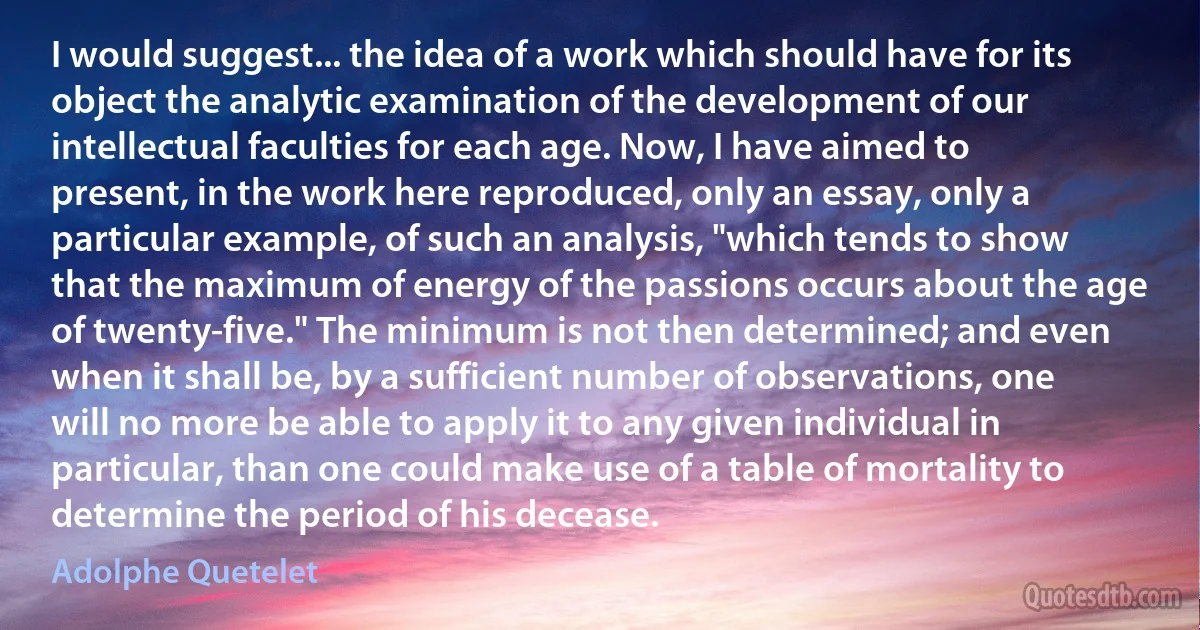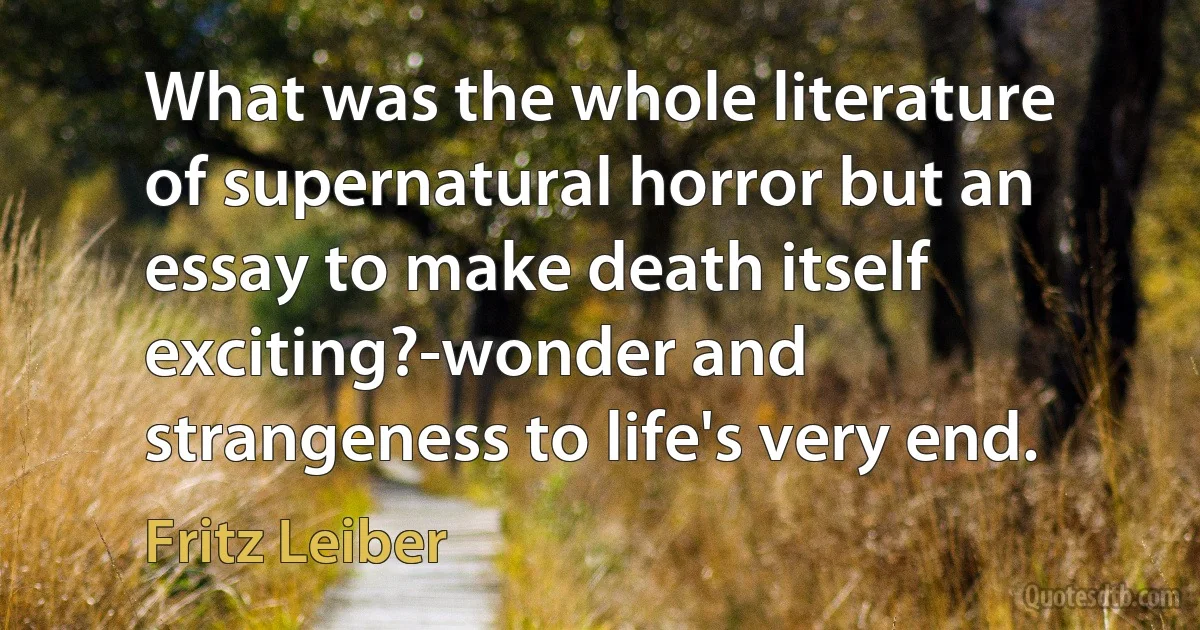Essay Quotes - page 2
This essay treats the most celebrated story in the extreme simplification in an adult parasite - in the interests of illuminating, reconciling, and, perhaps, even resolving two major biases that have so hindered our understanding of natural history: the misequation of evolution with progress, and the undervaluing of an organism by considering only its adult form and not the entire life cycle.

Stephen Jay Gould
I have long recognized the theory and aesthetic of such comprehensive display: show everything and incite wonder by sheer variety. But I had never realized how powerfully the decor of a cabinet museum can promote this goal until I saw the Dublin [Natural History Museum] fixtures redone right. [...] The exuberance is all of one piece-organic and architectural. I write this essay to offer my warmest congratulations to the Dublin Museum for choosing preservation-a decision not only scientifically right, but also ethically sound and decidedly courageous. The avant-garde is not an exclusive locus of courage; a principled stand within a reconstituted rear unit may call down just as much ridicule and demand equal fortitude. Crowds do not always rush off in admirable or defendable directions.

Stephen Jay Gould
Just as the human population was starting its unprecedented growth spurt in the late eighteenth century, this was published. It's a first edition of an essay on population by the English clergyman Thomas Malthus. Malthus made a very simple observation about the relationship between humans and resources and used it to look into the future. He pointed out that "the power of population is indefinitely greater than the power of the earth to produce subsistence for man." Food production can't increase as rapidly as human reproduction. Demand will eventually outstrip supply. Malthus goes on to say, if we don't control human reproduction voluntarily, life could end in misery, which earned him a reputation as a bit of a pessimist. But Malthus' principle remains true. The productive capacity or the Earth has physical limits and those limits will ultimately determine how many human beings it can support. m10s58-m12s18.

David Attenborough
The greater part of the substance of the following Essays has already been published in the form of Oral Discourses, addressed to widely different audiences, during the past three years. Upon the subject of the second Essay, I delivered six Lectures to the Working Men in 1860, and two, to the members of the Philosophical Institution of Edinburgh in 1862.

Thomas Henry Huxley
In this essay on econometrics in its conception and its use in economic planning for the betterment of man's fate, I will try to cover a very broad field.
When talking about the methodology in the particular fields mentioned - about which I am supposed to have a little more than second hand knowledge - I have always found it utterly inadequate to focus attention only on these special fields without seeing them in a much broader perspective.
Therefore it was inevitable that I should have to include in the field of vision of this paper also some branches of science where I can only speak as a layman, hopefully as a somewhat informed layman. For whatever blunders I may have made in these fields I must ask for the reader's forgiveness.

Ragnar Frisch
I conclude by listing several main points of this essay:
1. Human capital is of great importance in the modern economy.
2. Human capital has become of much greater significance during the past two decades.
3. Human capital is crucial to the international division of labor.
4. Much unmeasured learning goes on in companies and by adults.
5. People need to invest in themselves during their whole lives.
6. Distance learning will become of crucial importance to the teaching and learning process.
7. Human capital stimulates technological innovations and the high-tech sector.

Gary Becker
Nay, who knows, Phaedrus, if the efforts of humans in their search for God, the observances, the prayers they essay, their obstinate will to discover the most efficacious... who knows if mortals will not finally discover a certitude-or an incertitude-stable and in exact conformity with their nature, if not with the very nature of God?

Paul Valéry
As the essays kept appearing, so did the five male lawyers (not the same ones, different ones, but they seemed to hunt in packs). And so did the criminal cases, mostly for contempt of court. One of them ended in a very short jail sentence, another is still pending. The debates were often acrimonious. Sometimes violent. But always important. Almost every essay got me into enough trouble to make me promise myself that I wouldn't write another. But inevitably, situations arose in which the effort of keeping quiet set up such a noise in my head, such an ache in my blood, that I succumbed, and wrote.

Arundhati Roy
The numberless treatises of antiquities, philosophy, mathematics, natural and other history ... written originally in, or translated to our tongue are sufficient to lead us a great way into any science our curiosity shall prompt us to. The greatest difficulty we struggled with, was the want of a good art of reasoning, which we had not, that I know of, till that defect was supplied by Locke, whose Essay on Human Understanding makes large amends for the want of all others in that kind.

Mary Astell
This is the aim of the following essay: to show that, when we come to put the right construction on the Bible, we give to the Bible a real experimental basis, and keep on this basis throughout; instead of any basis of unverifiable assumption to start with, followed by a string of other unverifiable assumptions of the like kind, such as the received theology necessitates.
And this aim we cannot seek without coming in sight of another aim, too, which we have often and often pointed out, and tried to recommend: culture, the acquainting ourselves with the best that has been known and said in the world, and thus with the history of the human spirit.

Matthew Arnold
The whole scope of the essay is to recommend culture as the great help out of our present difficulties; culture being a pursuit of our total perfection by means of getting to know, on all the matters which most concern us, the best which has been thought and said in the world; and through this knowledge, turning a stream of fresh and free thought upon our stock notions and habits, which we now follow staunchly but mechanically, vainly imagining that there is a virtue in following them staunchly which makes up for the mischief of following them mechanically.

Matthew Arnold
Often we were joined by Maurice Princet. Although very young, he held an important post in an insurance company which he owed to his knowledge of mathematics. But outside his profession it was as an artist that he thought of mathematics, as a specialist in aesthetics that he evoked continuities in n dimensions. He liked to interest painters in the new visions of space that had been opened up by Victor Schlegel and several others. He succeeded. After having heard him by chance, Henri Matisse was caught reading an essay on hyperspace. Oh! it was only a potboiler [un ouvrage de vulgarisation]! but at least that shows that for the great 'fauve' the days of the painter who knows nothing, who runs towards a pretty subject with his beard blowing in the wind, was passed.

Jean Metzinger
In this essay I want to review some work on stigma, especially some popular work, to see what it can yield for sociology. An exercise will be undertaken in marking off the material on stigma from neighbouring facts, in showing how this material can be economically described within a single conceptual scheme, and in clarifying the relation of stigma to the subject matter of deviance. This task will allow me to formulate and use a special set of concepts, those that bear on 'social information', the information the individual directly conveys about himself.

Erving Goffman
Such was Gods Poem, this Worlds new Essay;
So wild and rude in its first draught it lay;
Th' ungovern'd parts no Correspondence knew,
An artless war from thwarting Motions grew;
Till they to Number and fixt Rules were brought
By the eternal Minds Poetique Thought.
Water and Air he for the Tenor chose,
Earth made the Base, the Treble Flame arose,
To th' active Moon a quick brisk stroke he gave,
To Saturns string a touch more soft and grave.
The motions Strait, and Round, and Swift, and Slow,
And Short, and Long, were mixt and woven so,
Did in such artful Figures smoothly fall,
As made this decent measur'd Dance of All.

Abraham Cowley
Writing stories was not easy. When they were turned into words, projects withered on the paper and ideas and images failed. How to reanimate them? Fortunately, the masters were there, teachers to learn from and examples to follow. Flaubert taught me that talent is unyielding discipline and long patience. Faulkner, that form – writing and structure – elevates or impoverishes subjects. Martorell, Cervantes, Dickens, Balzac, Tolstoy, Conrad, Thomas Mann, that scope and ambition are as important in a novel as stylistic dexterity and narrative strategy. Sartre, that words are acts, that a novel, a play, or an essay, engaged with the present moment and better options, can change the course of history. Camus and Orwell, that a literature stripped of morality is inhuman, and Malraux that heroism and the epic are as possible in the present as is the time of the Argonauts, the Odyssey, and the Iliad.

Mario Vargas Llosa
![My visceral perception of brotherhood harmonizes with our best modern biological knowledge. [...] Many people think (or fear) that equality of human races represents a hope of liberal sentimentality probably squashed by the hard realities of history. They are wrong. This essay can be summarized in a single phrase, a motto if you will: Human equality is a contingent fact of history. Equality is not true by definition; it is neither an ethical principle (though equal treatment may be) nor a statement about norms of social action. It just worked out that way. A hundred different and plausible scenarios for human history would have yielded other results (and moral dilemmas of enormous magnitude). They didn't happen. (Stephen Jay Gould)](https://cdn.quotesdtb.com/img/quotes_images_webp/28/stephen-jay-gould-action-445528.webp)


